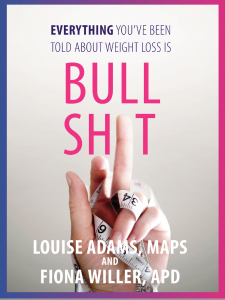The current hype about weight loss drugs is inescapable, and media coverage is worryingly – and consistently – uncritical. I recently came across this article on the ABC news website: ‘Doctors weigh societal costs of using obesity drugs to treat obesity crisis.’
But only one doctor – an ecstatic bariatric surgeon cashing in on the current enthusiasm for extreme weight loss – was quoted. The majority of the piece was an unsettling economic analysis of ‘treating’ larger bodied people, which perfectly encapsulated our dystopian diet culture in the ‘Age of Ozempic’.
It began by citing a drop in USA obesity rates as evidence for the efficacy of GLP1 weight loss drugs like Ozempic/Wegovy. While it’s true that the latest CDC data showed a small reduction of 1.5% (from 42.5% in 2017-2020 to 41% in 2020-2023), it’s much too early to interpret trends – let alone attribute causality. Transient BMI reductions were also observed in the 2011-2012 data. Globally, BMI increases have been slowing down since the 2000‘s – a fact rarely quoted in weight centric media.
Keen to set the requisite hysterical tone typical of ‘obesity’ reporting, the author invoked World Obesity Federation (WOF) projections that by 2035 more than half of the global population would have a BMI above 30. These figures were from the WOF’s ‘World Obesity Atlas‘, a report entirely paid for by Novo Nordisk – the very same company who produce Ozempic and Wegovy.
Referencing another report called ‘Tipping The Scales‘, ‘sobering’ numbers associated with larger bodied people were presented, amounting to billions of dollars in alleged healthcare costs. These numbers were drawn from a 2015 report by Obesity Australia which was also entirely funded by Novo Nordisk.
The article failed to disclose Novo’s financial role in any of these alarmist statistics. The journalist either didn’t know, or she didn’t think it important enough to include. I’m not sure which reason is worse.
|
|
With the argument resting solely on Novo Nordisk generated numbers readers were told that ‘weight loss drugs could reshape this grim economic outlook’. This journalist fell straight into the trap of acting as Novo’s marketing department. The lack of critical thinking was breath taking – but it was about to get much, much worse.
Health economist Jonathan Karnon offered an truly disturbing perspective on the economic implications of extending ‘obese’ people’s lifespans*, stating that while larger bodied people cost more than smaller ones, they also don’t live as long. But if larger people lived longer, they’d need even more healthcare. This, apparently, ‘complicates’ things for Karnon.
|
|
Such an unhinged train of thought is thoroughly unethical and smacks of eugenics. If Karnon had been commenting on an actual illness – such as childhood cancer – and had told the media that the benefits of apparently life saving drugs should be ‘balanced’ against the future health care costs of longer-lived children, we’d be horrified.
But thanks to weight stigma, Karnon’s poisonous comments didn’t even raise the journalist’s eyebrow, and the article was broadcast to millions of Australians over their weekend coffees.
It’s official: In the age of Ozempic, we’ve lost the ethical plot.
Mirroring Novo Nordisk’s narrative, the article framed the central ethical problem as being who gets ‘access’ to weight loss drugs. But the real ethical dilemma here is, as the journalist herself mentioned, ‘society’s deep seated unwillingness to accept overweight bodies in any form.’
Novo Nordisk are capitalising from widespread prejudice against larger people to push their agenda onto an uncritical world media, and spending unholy amounts of cash to command unprecedented control over the global ‘obesity’ narrative. This article will only add to the growing tsunami of weight loss drug propaganda and fat phobia.
If we’re to believe Novo’s predictions that half the planet will soon occupy a BMI above 30, is drugging 4 billion people in an expensive attempt to shrink us back to under 25 really the best course of action?
It is entirely possible to improve human health without focusing on weight loss. Weight inclusive approaches are health enhancing, ethical, and cost effective. And there’s strong evidence to support them: this 2024 article analysed 20 studies and found that regardless of BMI status, people classified as ‘fit’ had the same cardiovascular disease or all-cause mortality rate as those with a BMI below 25. Those classified as unfit had higher rates of cardiovascular disease and all cause mortality regardless of BMI status.
Another review compared cardio respiratory fitness vs traditional weight loss methods and reached similar conclusions. This paper also analysed the economics of weight inclusive approaches, which were, unsurprisingly, much cheaper than the outlandish costs Novo Nordisk are proposing.
Weight cycling is strongly linked to a number of life threatening health conditions commonly attributed to higher BMI, and all weight loss attempts – including surgery and weight loss drugs – result in weight regain for the vast majority. The gloating bariatric surgeon quoted in the article even admitted that his current influx of patients are those who have already tried the weight loss injections.
Not only are weight inclusive approaches evidence based, they avoid the cycle of weight loss and regain. Most importantly, weight inclusive health care is truly ethical, does no harm, and can meaningfully combat weight stigma.
|
|
I’ve written to the ABC and directly to the journalist, asking them to (at the very least) disclose Novo’s funding of the hysterical statistics. I also asked her to remove the disturbing and offensive comments from Dr Karnon, and to consider including an opposing viewpoint.
Unsurprisingly, I’ve had no response.
Louise xx
* This is a fiercely contested assumption riddled with weight stigma. Mortality rates associated with high BMI are inextricably intertwined with a host of factors – socioeconomic status, race, quality of healthcare, fitness levels, discrimination and exclusion, and weight cycling history – to name but a few. Blaming everything on BMI is lazy science. And of course, there’s no evidence that taking weight loss drugs increases lifespan.
If you are struggling with issues relating to food, your body, exercise, or with an eating disorder, I can help. No judgement if you’re taking weight loss medication, just practical strategies and a size inclusive lens from an experienced clinical psychologist. I have offices in Kirribill, Sydney, and am available for online appointments. If you’re a health professional I offer weight-inclusive clinical supervision, click here to make an appointment.


